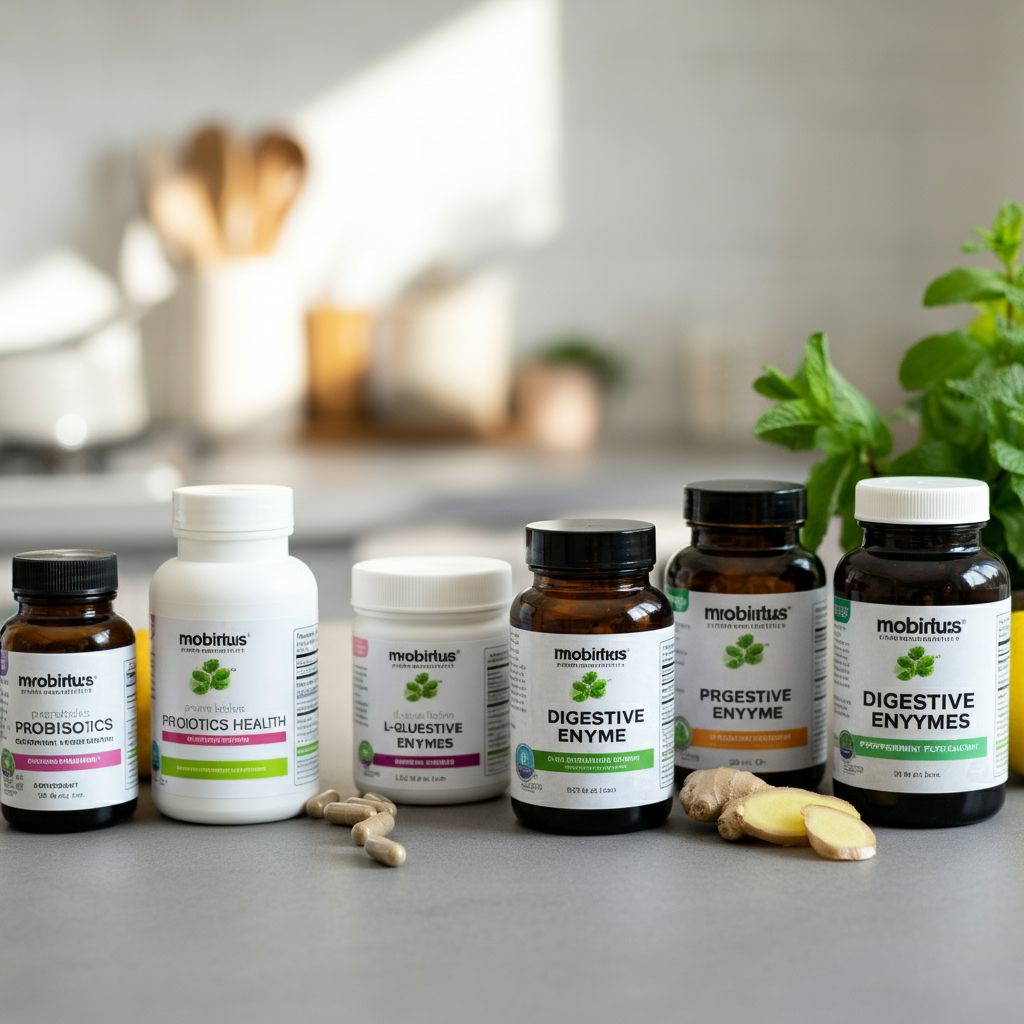Your gut health plays a crucial role in keeping your entire body in balance. From breaking down food to supporting your immune system, your digestive system is a powerhouse that affects your energy levels, mood, and overall wellness. But with the growing awareness of gut health, digestive health supplements have become a popular way to give our intestines a little extra TLC. This guide will walk you through the essentials of digestive health supplements, including their benefits, how to choose the right one, and how lifestyle changes can give your gut an even greater boost. Let’s get started! What You Need to Know About Digestive Health and Supplements Your digestive system is like a finely tuned machine. When it’s working seamlessly, you barely notice it. But when things go off-track, bloating, indigestion, and other unpleasant symptoms can quickly take center stage. That’s where digestive health supplements come in. These supplements are designed to support your gut in various ways, from populating your intestines with good bacteria to helping your stomach break down food more efficiently. Though not a replacement for a healthy diet, they can complement your efforts to maintain good digestion and overall health. But how do these supplements work, and what are the key ingredients that make them effective? Understanding the Gut Microbiome Your gut microbiome is home to trillions of microorganisms, including bacteria, viruses, and fungi. These microbes aren’t just passive inhabitants of your digestive system; they play an active role in breaking down food, producing …
Your gut health plays a crucial role in keeping your entire body in balance. From breaking down food to supporting your immune system, your digestive system is a powerhouse that affects your energy levels, mood, and overall wellness. But with the growing awareness of gut health, digestive health supplements have become a popular way to give our intestines a little extra TLC.
This guide will walk you through the essentials of digestive health supplements, including their benefits, how to choose the right one, and how lifestyle changes can give your gut an even greater boost. Let’s get started!
What You Need to Know About Digestive Health and Supplements
Your digestive system is like a finely tuned machine. When it’s working seamlessly, you barely notice it. But when things go off-track, bloating, indigestion, and other unpleasant symptoms can quickly take center stage. That’s where digestive health supplements come in.
These supplements are designed to support your gut in various ways, from populating your intestines with good bacteria to helping your stomach break down food more efficiently. Though not a replacement for a healthy diet, they can complement your efforts to maintain good digestion and overall health.
But how do these supplements work, and what are the key ingredients that make them effective?
Understanding the Gut Microbiome
Your gut microbiome is home to trillions of microorganisms, including bacteria, viruses, and fungi. These microbes aren’t just passive inhabitants of your digestive system; they play an active role in breaking down food, producing essential nutrients, and regulating your immune system.
When your gut microbiome is healthy and balanced, your digestive system functions smoothly. But factors like poor diet, stress, antibiotics, and lack of sleep can disrupt this delicate balance, leading to issues like bloating, constipation, or even chronic illnesses.
Digestive health supplements aim to either maintain this balance or restore it when things go awry.
Key Supplements for Digestive Health
Not all digestive health supplements are created equal. Here’s a closer look at the most effective types and how they benefit your gut.
Probiotics
Probiotics are live bacteria and yeasts that add to the good bacteria in your gut. They are incredibly effective for restoring balance after a course of antibiotics or improving symptoms of irritable bowel syndrome (IBS).
Sources:
- Yogurt
- Fermented foods like kimchi and sauerkraut
- Capsule or powder supplements
Prebiotics
Think of prebiotics as food for your probiotics. They are non-digestible fibers that fuel good bacteria, promoting their growth and activity.
Popular prebiotic ingredients:
- Chicory root
- Garlic
- Bananas
Digestive Enzymes
Digestive enzymes help your body break down food more efficiently, reducing bloating and improving nutrient absorption.
The three main types are:
- Amylase (breaks down carbs)
- Protease (breaks down proteins)
- Lipase (breaks down fat)
L-Glutamine
L-Glutamine is an amino acid that helps heal the gut lining, particularly for those suffering from leaky gut syndrome or inflammation.
Best for:
- Supporting gut repair
- Enhancing nutrient absorption
Ginger
Ginger is widely known for its ability to reduce nausea and support overall digestion. It has anti-inflammatory properties that can soothe your stomach lining and improve gastric emptying.
Try it as:
- Capsules
- Ginger tea or chews
Peppermint Oil
Peppermint oil is a hidden gem for alleviating IBS symptoms like cramping and bloating. Its antispasmodic properties work wonders on an upset stomach.
Use with caution:
Enteric-coated capsules are recommended to avoid irritation in the upper digestive tract.
How to Choose the Right Supplements
- Identify Your Needs: Bloating? Constipation? Consider supplements tailored to specific symptoms.
- Check for Quality: Look for third-party testing to ensure the supplement is free of contaminants.
- Read Labels: Opt for supplements with minimal fillers and added sugars.
- Consult a Professional: Always speak to a healthcare provider, especially if you’re taking medications or have existing health conditions.
Remember, the most expensive supplement isn’t always the most effective.
Lifestyle Factors That Support Digestive Health
Supplements can work wonders, but pairing them with healthy lifestyle habits is where the magic happens.
1. Eat a Fiber-Rich Diet
Fiber promotes regular bowel movements and feeds your gut bacteria. Incorporate whole grains, fruits, vegetables, and legumes into your meals.
2. Stay Hydrated
Water is essential for digestion. It helps break down food and keeps things moving smoothly in your intestines.
3. Manage Stress
Stress can wreak havoc on your gut. Practices like yoga, mindfulness, or deep breathing exercises can go a long way in reducing stress-related digestive issues.
4. Exercise Regularly
Physical activity promotes intestinal motility and improves the overall health of your digestive system. Remember, even a 30-minute walk can make a difference!
5. Avoid Overeating
Eating smaller, more frequent meals can be easier on your digestive system.
6. Get Enough Sleep
Sleep is when your body repairs itself, and that includes your gut. Aim for 7–9 hours per night.
Potential Risks and Side Effects
Digestive health supplements are generally safe, but they’re not without caveats.
Common Side Effects:
- Probiotics can cause mild bloating or gas when first introduced.
- Digestive Enzymes may lead to irritation if taken improperly or in high doses.
- Peppermint Oil can sometimes worsen heartburn for those prone to acid reflux.
Always follow the recommended dosage and discontinue use if you experience any adverse effects.
A Holistic Approach to Digestive Wellness
Supporting your digestive system is about more than just popping a pill. It’s a combination of supplements, healthy eating, regular exercise, and effective stress management.
Digestive health supplements can be a game-changer for restoring balance and alleviating discomfort, but they work best as part of a holistic lifestyle. Start small, listen to your body, and consult a healthcare provider to ensure you’re making choices that truly benefit your unique needs.
Got questions about which supplements are right for you? Stay tuned to our blog for even more tips on achieving optimal digestive health.
Sign up for free class
It’s easy and free!










